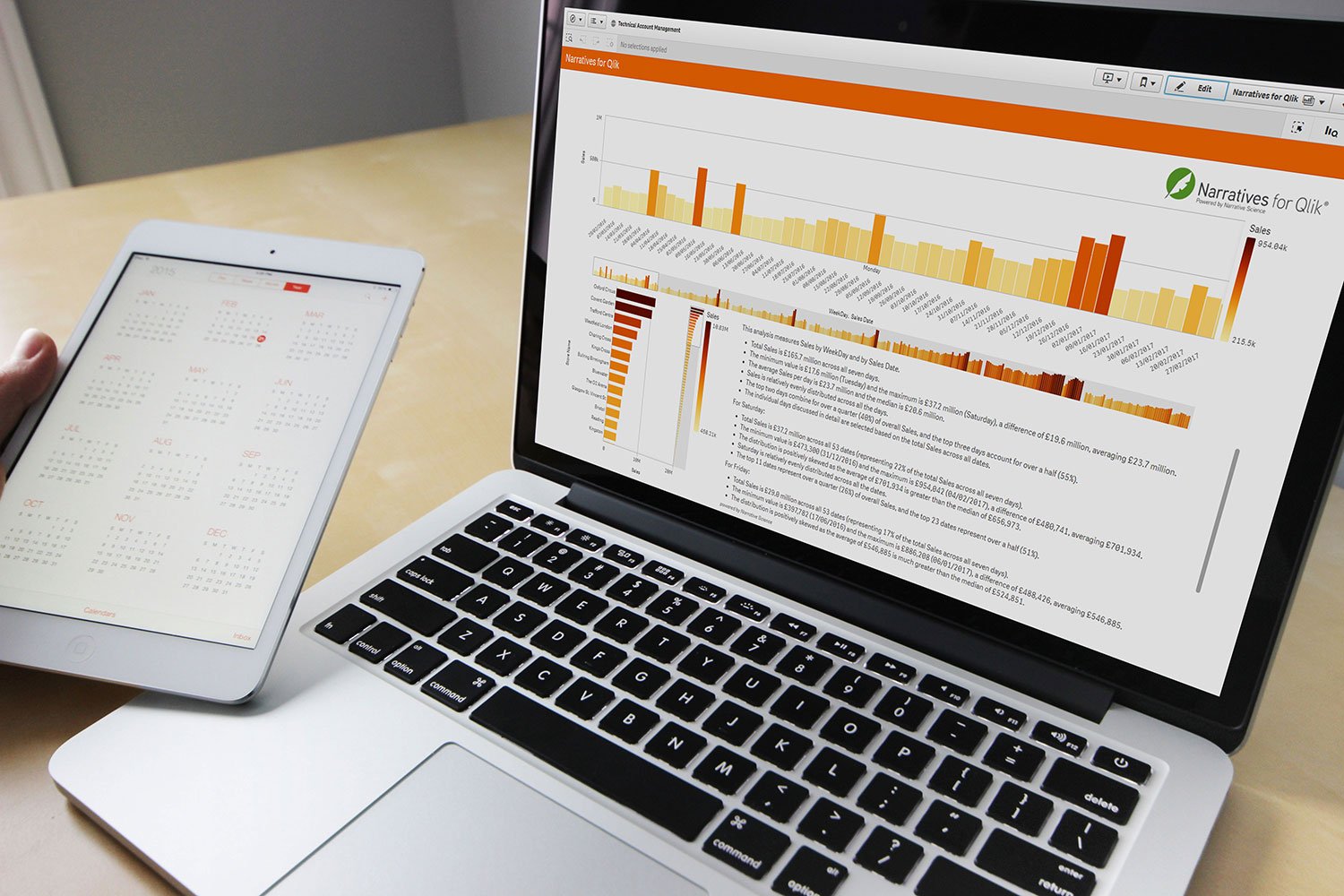BI Predictions for 2018
With that said, you probably want to hear a little bit more, so we asked Ometis Sales Manager Andy Patrick and Pre-Sales Consultant Christopher Lofthouse for their opinions on BI trends in 2018.
From the evolution of business analytics and artificial intelligence in BI to IoT devices and augmented analytics, Andy and Chris have all the latest trends in business intelligence.
IoT Data in 2018
Andy:
‘Last year, more organisations (customers and prospects) were considering IoT projects and Qlik. I think there was a realisation that Analytics platforms like Qlik could help reap higher rewards the more analysis you can get from them. Of course, that means having the ability to get data into these platforms in an automated way, have easy transformation processes and derive value from easy-to-interpret and business-friendly visualisations. In 2017, companies that were capturing data like this, not just the traditional sales analysis and financial information reporting, were looking to invest in projects where data was born and resides in the cloud or on devices (IoT). We’re going to see this trend continue in 2018.’
Chris:
‘The biggest evolution in 2017 for me, was summed up in Qlik’s messaging on “leaving data where it is”. Over the past few years the focus has been on understanding big data and extracting value out of it. Today organisations understand what big data is to them but the confusion, or lack of knowledge, comes in the form of what solution is right for them. Larger organisations have the capacity and budget to build data warehouses to keep their reporting data centralised. However, there is a growing adoption in decentralised data storage. In the past, there was a negative stigma attached to this but acceptance has led to organisations accepting this reality and benefiting in the agility it provides.
‘Qlik’s aforementioned messaging reflects this. Using technologies, like Qlik, allows organisation to connect to disparate sources, enabling them to achieve a centralised and governed reporting platform, despite their source systems potentially being built on data silos/decentralised systems. The focus has therefore shifted from ‘Where do we store data?’ to ‘Where do we consume it?’. This focus is going to continue in 2018 and there will continue to be a large focus on data quality as well. I believe that agile solutions, such as Qlik, will result in data being transformed more often, at least for the short term, rather than corrected immediately at source. This enables businesses to achieve their reporting requirements more swiftly, extracting the value from the data and seeing that ROI.’
Augmented Analytics is the Future of Data and Analytics
Chris:
‘Artificial Intelligence covers a wide scope. For most, AI is the concept that will eventually replace human intelligence; AI learns, remembers, solves problems and even makes decisions. As you can imagine, this takes time and planning. While this will be talked about heavily in 2018, I don’t see it having massive adoption, mainly due to the costs involved and more notably, there is a lack of human resources who are specialised and can push this area forward quick enough in the foreseeable future. This year will see a large investment from enterprise companies to train their R&D team in areas such as machine learning.
‘Having said that, a subset of Artificial Intelligence is Augmented Intelligence and I see this rising rapidly. Augmented Intelligence focuses on enhancing and assisting human intelligence. 2018, I believe, will be the year of Augmented Intelligence. With more people, analysing more data, more regularly it can become harder to see the wood for the trees. After all, many people are not data scientists, and don’t have the time to study to become one. The clear demand for now, is ensuring all data consumers can consistently obtain the same facts and figures as the next person (everyone needs to be equally informed). For us, this comes in the form of Narratives for Qlik.
‘Narratives for Qlik automatically generates a natural language narrative based on a given visualisation you point it at or data you provide it. Other forms of Augmented Intelligence are ‘chat bots’. Chat bots have become very popular among the development community. Examples of Qlik integrated with Amazon’s Alexa and Echo Show, as well as Telegram, have all been made available for the public to see. One thing is for sure, things are about to get interesting!’
Evolution of Business Intelligence
Andy:
‘In my opinion, there are two main areas that will dominate people’s thoughts around BI this coming year. With all the talk of GDPR and its imminent arrival, I believe there will be a focus on data integrity and data governance. Don’t get me wrong, even an excellent BI Platform like Qlik’s can’t solve all your GDPR needs, but there will be an added impetus for CDOs to focus on how they obtain the data they are reporting on and how easy it is to audit that data when needed.
‘The other main area of evolution will be self-service. There will still be a drive for organisations to become more productive and what better way than empowering all the people in an organisation to get the answers to questions they need for themselves. Combine this push for better data governance and accuracy and suddenly we have a real capability to increase the data literacy in entire organisations. Companies are moving away from having all the reporting capabilities reserved just for the privileged few and they are starting to see that by harnessing the knowledge of all employees and empowering the workforce, the organisation becomes slicker and more productive.’
Chris:
‘I agree with Andy, GDPR and self-service will both have a huge influence on 2018 but I also think it’s worth watching the initiatives such as Qlik’s subscription model take hold. 2018 will see barriers lowered to entry for BI tools due to subscription prices. Putting data in the hands of everyone is becoming a reality with Qlik’s consumer licenses – while temporary, I think we may see it become permanent.’
Artificial Intelligence in Business
Andy:
‘For the foreseeable future, people will have AI on their hot-topics’ list. We have seen the introduction of elements of Artificial Intelligence reaching Business Intelligence platforms in 2017, this can be seen by looking at Narrative Science and their integration capabilities in to products like Qlik Sense. We have also seen a rise in our customers’ need to get a deeper interpretation of what data and visualisations are telling them. Narratives for Qlik is a perfect example of bring NLG (natural language generation) in to Business Intelligence. In 2018, you’re going to see more of these types of products, or at least the groundwork going in to build them.’
Chris:
‘Personally, I think AI will continue to be a discussion point in 2018. More and more companies are seeking data scientists, which is a signal that AI will become an important factor in years to come. However, the majority of companies need/want a human’s understanding of their data before letting a machine take a punt! Having said that, companies such as Narrative Science will continue to make strides in the area, and data examined by the early adopters will shape those tools and how we will use them in the future. My hope for AI is that it becomes simplified and more integrated with daily reporting. Except for Narrative Science it seems, at the moment, you have to be a technical person/scientist to truly utilise any form of AI.’
BI Influences in 2018
Andy:
‘For me, this will be budgets and legislation, with a tinge of what Gartner says. People, and therefore organisations, follow trends, so if Gartner says something is going to trend in 2018, it often becomes a self-fulfilling prophecy.
‘Budget is always a factor that will influence new projects off the ground. With all the best intentions and will to get more value from your data, there still must be an initial budget. Luckily, we can often talk to people about the ROI. That comes from either time saving through the automated process, giving insight to inform strategic decision-making or finding the hidden gems in your data (Qlik has a competitive advantage in this area). In 2018, we’ll also see organisations bringing all the data in from disparate sources and allowing companies to see the related data, but maybe more importantly, the un-related data.’
Chris:
‘GDPR is going to have a big influence on the year, even post GDPR implementation at the end of May. It leads onto a bigger point around legislation. I think we’ll see factors such as GDPR, Basel III and gender pay gap reporting, to highlight a few topics, that will drive projects around data collection and reporting (business intelligence).’
BI Predictions for 2018
Andy:
‘Firstly, I predict a bright future for Ometis. We have grown substantially over the past five years, with customer service and Qlik at the heart of everything we do. We are a single platform provider, which means we can focus all our attention on the roadmap presented to us by Qlik.
‘Not only do we have the necessary skills to deliver value to our clients using Qlik but we have a much deeper knowledge of Qlik than most because we are not diluting our understanding of the platform we work on. This enables us to keep up-to-speed with the innovation that Qlik’s release cadence enables. We can talk to our customers about what they should be thinking of doing in six or 12 months’ time, not just reacting to the flames that are highest right now.
‘I also predict that Qlik will continue to be a leader in Gartner’s magic quadrant, and Qlik Sense is the predominant force behind this. Qlik offer a true platform approach, right from data acquisition, data loading, visual data prep, comprehensive data transformation capability, then through to consumption on any device, self-service, robust governance of data and the embedding and delivery of management information in different formats. Qlik has a unique opportunity to pull away from its competitors and its move to include subscription options for licenses, on-premise, cloud-based or a hybrid can only help this happen. We expect Qlik to continue dominating the core market surveys, like those produced by Gartner and BARC.
‘And finally, I predict more SMEs will leverage what was once seen as a luxury only for larger enterprises – an enterprise analytics and reporting platform.’
Chris:
‘I think it’s fairly clear that 2018 will be a big year for business intelligence. There are a lot of areas to keep on a lookout for over the coming 12 months but for me, there are three really hot topics:
1. Companies, and their tools, will be named and shamed with regards to the looming GDPR.
2. Focus on Data’s data will spike in demand, partly as a result of GDPR but also because companies/people want to track and analyse everything! NodeGraph is a good example of a product I feel will generate massive interest in the coming year due to these factors.
3. Integration of external data will become mainstream.
‘It’s clear from previous years that business intelligence is becoming more understood, and ultimately required, by organisations to make efficient, informed decisions. I feel that in 2018, this rapid growth will continue and by the new year, business intelligence will have been recognised as a hugely important factor in securing a competitive advantage.’





Comments